How To Set Up Company in Vietnam: What 8 Key Steps To Follow?

Starting a new venture in Asia often feels complex, especially when you want to set up company in Vietnam. Legal steps, paperwork, and regulations can overwhelm even experienced investors searching for clarity on how to setting up a company in Vietnam. This MOR Software’s guide will walk you through the process step by step, helping you understand requirements and avoid costly mistakes.
Why Foreign Investors Choose To Set Up Company In Vietnam
Foreign investors are paying close attention to Vietnam when looking to set up company in Vietnam. The country has built a strong case as a destination where new ventures can thrive. Vietnam’s GDP grew 7.09% in 2024, one of the fastest in the region.
The economy has been expanding at a steady pace, supported by consistent GDP growth and a business environment that welcomes international capital. Reforms in recent years have encouraged competition and opened more opportunities for Vietnam business registration, creating conditions that appeal to global investors. Disbursed FDI reached a record 25.35 billion dollars in 2024, up 9.4% year over year.
Vietnam’s location adds to its advantage. Positioned in the heart of Southeast Asia, it provides easy access to nearby markets and supply chains. Its participation in trade pacts like CPTPP and the ASEAN Economic Community strengthens connections and creates favorable rules for cross-border trade. Exports jumped 16% in July 2025 to 42.3 billion dollars, a sign of strong global demand routed through Vietnam.
Another important factor is the workforce. Vietnam has a young, skilled labor pool with competitive wages, which is especially attractive to manufacturing and service-oriented industries. The median age sits near the early thirties, a youthful labor profile that supports productivity and consumption.
Average industry and construction wages were about 8.4 million VND per month in early 2024, which helps investors manage cost structures. On the demand side, 98% of Vietnamese consumers said they visited cafes, restaurants, or similar venues in early 2025, a reminder of resilient local spending.
For these reasons, many investors view Vietnam as a smart choice to expand operations and set up company in Vietnam, given the mix of market potential, policy support, and strategic advantages. McKinsey projects 36 million more people could join Vietnam’s consuming class by 2030, expanding the customer base for new entrants.
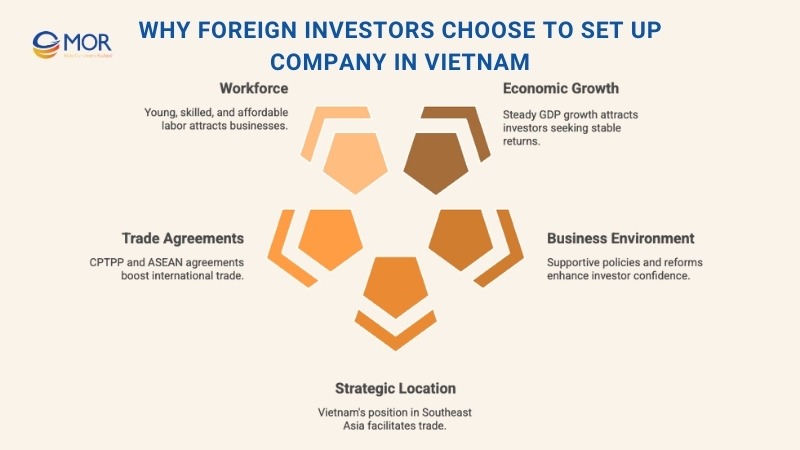
Why Foreign Investors Choose To Set Up Company In Vietnam
Picking The Right Business Structure
When foreign investors plan to set up company in Vietnam, one of the first decisions is choosing the right type of legal entity. Vietnamese law provides three common structures: representative office, branch, and company.
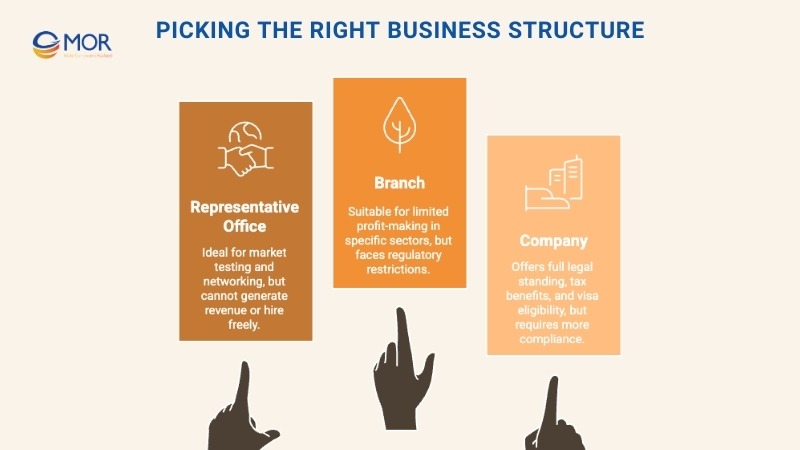
Picking The Right Business Structure
Representative Office
A Representative Office (RO) in Vietnam is considered a dependent unit of a foreign parent company. It can be established to study the local market and handle approved activities related to promotion and liaison, but it does not qualify as a fully independent Vietnamese company.
Pros: Setting up a Representative Office is a practical option for businesses that want to test the market before making larger investments. It allows foreign investors to build relationships with partners and monitor opportunities without the cost and obligations of full incorporation. The registration process is relatively simple compared to other structures.
Cons: To qualify for an RO, the parent company must already have at least one year of operation in its home country. The RO cannot engage in direct revenue-generating activities, issue invoices, or sign contracts on behalf of the parent company. Hiring is also restricted, which limits its operational flexibility.
Branch
A Branch in Vietnam is also a dependent unit of a foreign parent company, but unlike a representative office, it may conduct certain business operations. Under Vietnamese law, a branch can be involved in profit-generating activities, though only within restricted industries such as banking, insurance, and legal services.
To qualify, the parent company must have maintained at least five years of continuous operation before applying.
Cons: In reality, the branch model is rarely chosen by foreign investors when they decide to set up company in Vietnam. Regulatory limits and sector-specific restrictions mean it is less flexible than forming a fully independent entity through Vietnam incorporation. For that reason, many investors prefer to establish companies instead of branches to gain broader access to the local market.
Company
A Company in Vietnam is an independent legal entity with its own name, assets, and registered office. It is formed under Vietnamese law for business activities and may be structured as either a limited liability company or a joint-stock company.
Foreign investors have different pathways when choosing how to setting up a company in Vietnam:
- Establish a 100% foreign-owned company: Most sectors allow full foreign ownership. This option gives investors complete control over operations, management, and profit distribution.
- Form a joint venture with Vietnamese partners: For certain industries like advertising, agriculture, gaming, or forestry, investors must partner with a local entity. In other sectors, partnering remains optional but can help navigate regulations and the local market.
- Set up a nominee-owned company: Some investors consider using a Vietnamese individual as the official owner to shorten the process. While it may appear cheaper and quicker, this method is not legal and exposes both parties to considerable risks.
- Acquire an existing Vietnamese company: Purchasing a local business provides immediate market entry and operational capacity. Still, thorough due diligence is crucial to avoid inheriting hidden liabilities. Deal activity remains meaningful, with 2.3 billion dollars across 141 private capital deals recorded in 2024
Pros: Creating a company offers full legal standing in Vietnam. Investors can access tax deductions, apply for long-term visas, enjoy incentives from Free Trade Agreements, and tap into Vietnam’s young labor force. A company structure also separates personal and corporate liability. Manufacturing and processing attracted nearly 67% of total FDI in 2024, which shows where most foreign-backed operations concentrate.
Cons: To set up company in Vietnam as a company requires more time and compliance. Investors must follow corporate reporting obligations and pay profit taxes, which can make ongoing management more demanding.
Key Requirements To Set Up Company In Vietnam
Before you set up company in Vietnam, investors need to review several legal and practical requirements. These include investment conditions, available capital, a registered address, the type of company, appointment of a legal representative, and preparation of required documents.
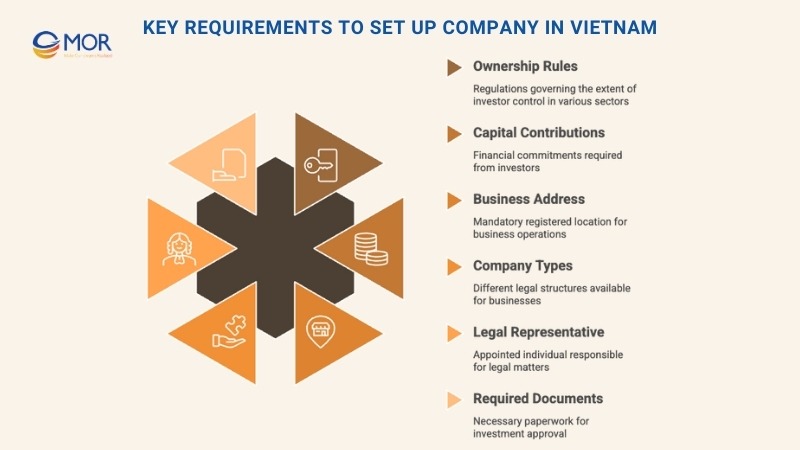
Key Requirements To Set Up Company In Vietnam
Investment And Business Conditions
Foreign investors are permitted to establish companies with full ownership in many sectors. Common areas include import and export, wholesale distribution, manufacturing, management consulting, IT services, and a wide range of technical services. Some of these, like IT, may also qualify for government tax incentives.
Digital adoption is broad, with an estimated 79.8 million internet users at the start of 2025, equal to 78.8% penetration. This supports online services, eCommerce, and omnichannel strategies.
There are industries where foreign ownership is allowed but subject to additional requirements during registration and operation. These conditions often apply to retail, F&B, education, overseas study consulting, healthcare, property development, logistics, and large-scale ventures. Each sector comes with unique rules that may affect how smoothly the business can operate.
Construction also remains a meaningful part of the economy, contributing just over 6% of GDP in 2023.
Certain areas are entirely restricted. Examples include press and media activities, labor export, temporary import with re-export, and domestic tourism services. These restrictions are strictly enforced by the Vietnam business registry, making it essential to confirm the legal scope before moving forward.
For anyone considering how to check company registration in Vietnam, it is strongly advised to seek professional legal advice early. This helps clarify whether your intended business activities qualify for approval and ensures that all conditions are fully met.
Investment Capital
When investors set up company in Vietnam, they must declare the total amount of investment capital. This consists of two parts: contributed capital and loan capital. Contributed capital is mandatory and must be fully paid within 90 days from the official establishment date. Loan capital, on the other hand, is optional and may be arranged later to support operations.
At the stage of project registration, investors must also show proof of financial capacity. Documents often required include bank statements, financial reports, or certificates confirming available account balances. These serve as evidence that the investor can fund the planned activities of the business.
Vietnamese law does not impose a fixed minimum investment capital across all industries. However, licensing authorities review each application based on project size, type of business, and sector. Minimum capital levels are set case by case to ensure feasibility.
In recent years, some licensing offices, particularly in the northern provinces, have raised the bar by requiring higher minimum capital contributions. For that reason, it is wise to prepare sufficient funding to cover at least the first one or two years of expenses until revenue begins to flow. Having adequate initial capital reduces the risk of needing to adjust registration later if the company’s account balance drops too low.
There is another benefit to higher contributions: larger registered capital can support applications for longer-term visas for investors and their families. This makes careful planning of funds an important step in Vietnam company registration.
Business Address
Every foreign-owned business must declare a registered address in Vietnam to serve as its head office. This is the official place of management and will be listed in the company charter. In most cases, the best option is to choose an address where daily operations are actually carried out.
For service companies in big hubs like Ho Chi Minh City or Hanoi, authorities may approve the use of a virtual office, provided it meets local requirements.
Once registered, the company can operate across Vietnam without limitation. It can also set up additional units, including representative offices, branches, or other business sites. These are recognized as dependent entities linked to the parent company but still recorded separately in the Vietnam business registry.
Company Types
Foreign investors generally select from three structures when deciding to set up company in Vietnam:
- Single-Member Limited Liability Company (LLC): Owned by a single investor. This model offers the simplest form of governance.
- Multiple-Member LLC: Requires between two and fifty investors. It is straightforward to manage but involves more members in decision-making.
- Joint Stock Company (JSC): Needs at least three shareholders and comes with a more complex management structure suitable for larger ventures.
Choosing among these structures depends on how many investors are involved and the management model that fits the business. Tax treatment is uniform across all structures, so the decision is based mostly on control and governance.
In practice, the limited liability model is preferred by small and medium enterprises due to its simplicity and lower compliance obligations under Vietnam company formation rules.
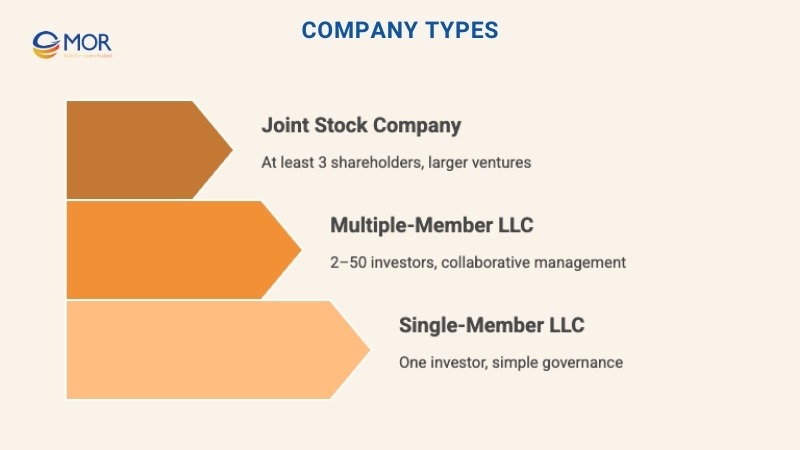
Company Types In Vietnam
Legal Representative
When investors set up company in Vietnam, they must appoint at least one legal representative. This person may be a Vietnamese national or a foreigner, but their details will appear on the Enterprise Registration Certificate as the official signatory of the company.
The legal representative must reside in Vietnam. If there is only one representative and that person leaves the country, they are required to delegate authority through a notarized letter to another resident in Vietnam. While some investors consider using a local nominee as their legal representative, the law does not demand this. The decision depends entirely on business needs and internal management preferences.
Required Documents
To complete incorporation, foreign investors must prepare specific documents. In the case of corporate investors, additional paperwork is needed, and certain documents must go through a legalization process before submission. Below is a breakdown:
Individual Investor | Corporate Investor |
| Valid passports of all individual investors | - Company Registration Certificate - Passport/ID card of the authorized representative(s) |
| Bank account balance certificate (showing an amount equal to or higher than the committed capital) | - Financial statements from the last two fiscal years - Bank account balance certificate |
| Lease contract and related legal documents for the registered business address | Lease contract and supporting legal documentation for the registered business address |
Collecting and verifying these documents is a key part of how to set up company in Vietnam, and working with local advisors helps avoid delays or rejection during the registration process.
8 Key Steps To Set Up Company In Vietnam
Foreign investors must follow a clear procedure to legally set up company in Vietnam. The process involves multiple stages, from registering the investment project to finalizing post-licensing tasks.
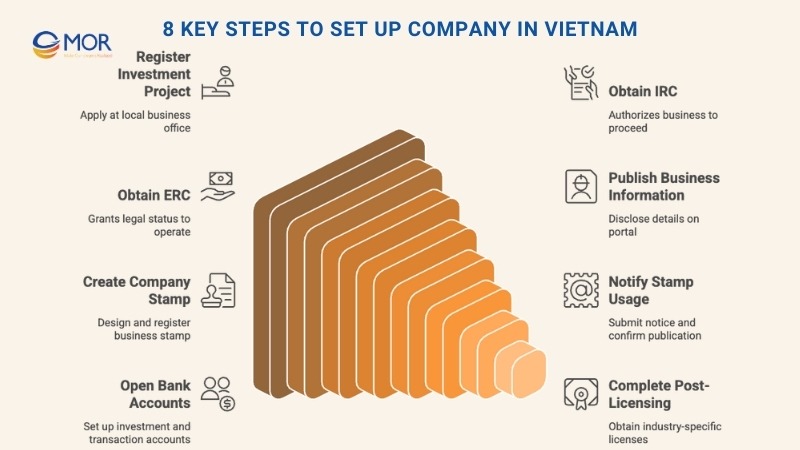
8 Key Steps To Set Up Company In Vietnam
Step 1 – Register The Investment Project
Investors need to submit an investment project application to the Business Registration Office in the relevant province or city. If the company will be based in an industrial park, export processing zone, or high-tech zone, the application is filed with the respective management board.
Approval is typically issued within 15 working days, excluding any additional time required for clarifications or revisions. This marks the first official step in Vietnam company registration.
Step 2 – Apply For The Investment Registration Certificate (IRC)
Once the investment project is approved, the next step is to prepare and submit the application for the Investment Registration Certificate. The file must be delivered to the Department of Planning and Investment within 10 days.
This document serves as proof that the government authorizes the investor to move forward with establishing a legal business presence. Without this certificate, investors cannot proceed with later stages of the process.
Step 3 – Apply For The Enterprise Registration Certificate (ERC)
After receiving the Investment Registration Certificate, the next stage is to apply for the Enterprise Registration Certificate. This application must be submitted to the Enterprise Registration Office within three working days.
The ERC formally recognizes the company as a legal business entity and gives it the right to operate under Vietnamese law. Without this step, investors cannot officially set up company in Vietnam and begin conducting business activities.
Step 4 – Publish Business Registration Information
Once the ERC has been issued, the company is required to announce its registration details on the National Business Registration Portal. This disclosure must take place within 30 days. The published content includes the company’s official business lines, along with the list of founding shareholders.
For joint-stock companies, the list must also highlight all foreign shareholders. Publishing this information ensures compliance and transparency within the Vietnam incorporation process.
Step 5 – Create The Official Company Stamp
Every enterprise has the right to design its own business stamp, choosing the shape, size, and number of stamps to be used. The only mandatory details that must appear are the company’s registered name and its business code.
Once the stamp has been created, the company must notify the Business Registration Office before it can be used. This notice ensures that the sample is published on the National Business Registration Portal, making the stamp legally valid for contracts and other official purposes. This step is an important milestone for investors completing the process to set up company in Vietnam.
Step 6 – Notify Authorities Of Stamp Usage
After the stamp is finalized, the company is required to file a notice of use with the Investment Registration Agency. Upon submission, the agency issues an official receipt confirming that the stamp has been registered.
The agency then publishes the notice on the National Business Information Portal, along with the samples of stamps belonging to the company, its branches, or any representative offices. Completing this step guarantees proper recognition and transparency in how to setting up a company in Vietnam.
Step 7 – Open Required Bank Accounts
Once the company has been established, investors must open two separate bank accounts in Vietnam. The first is an investment capital account, which is specifically used to receive the declared capital from abroad.
The second is a transaction account, which supports the company’s daily financial operations inside the country. Both accounts must be opened with a licensed commercial bank in Vietnam, and they are essential for compliance when you set up company in Vietnam.
Step 8 – Complete Post-Licensing Requirements
After licensing is finalized, companies operating in conditional business sectors must fulfill additional obligations before starting operations. These include applying for certificates of business eligibility, professional practice licenses, proof of legal capital, or purchasing liability insurance, depending on the industry.
Completing these requirements ensures that the Vietnamese company is legally permitted to engage in its chosen line of business and avoids regulatory issues during operation.
Fees And Timelines For Setting Up A Company In Vietnam (2025)
When investors plan to set up company in Vietnam, it is essential to prepare for both the cost and the expected registration timeline. Having clear expectations about fees and duration helps avoid surprises and ensures better project planning for your business entry.
Fees
The average cost to establish a Vietnam limited liability company in 2025 is around US$20,840. This amount typically covers company incorporation, corporate bank account opening, legal registered address, government fees, and project management services during the registration process.
Entity Type in Vietnam | Estimated Cost |
| Professional services LLC | US$20,840 |
| Trading and distribution LLC | US$25,840 |
| Manufacturing LLC | US$37,275 |
| Wholly foreign-owned LLC | US$25,745 |
| Locally-owned LLC | US$13,860 |
| Vietnam free zone LLC | US$22,275 |
| Branch of a foreign company | US$24,020 |
| Representative office | US$18,990 |
| Foreign company subsidiary LLC | US$20,740 |
| Joint venture LLC | US$19,740 |
| LLC with employment visas | US$22,690 |
| Joint stock company | US$21,620 |
| Vietnam fast nominee LLC | US$38,550 |
| Tax resident LLC (financial services) | US$38,240 |
| Holding company | US$20,740 |
| Annual renewal (Vietnamese entity) | US$16,845 |
Besides these incorporation costs, investors should also factor in post-licensing expenses such as accounting, compliance, and potential sector-specific permits, which may affect the overall cost of Vietnam company registration.
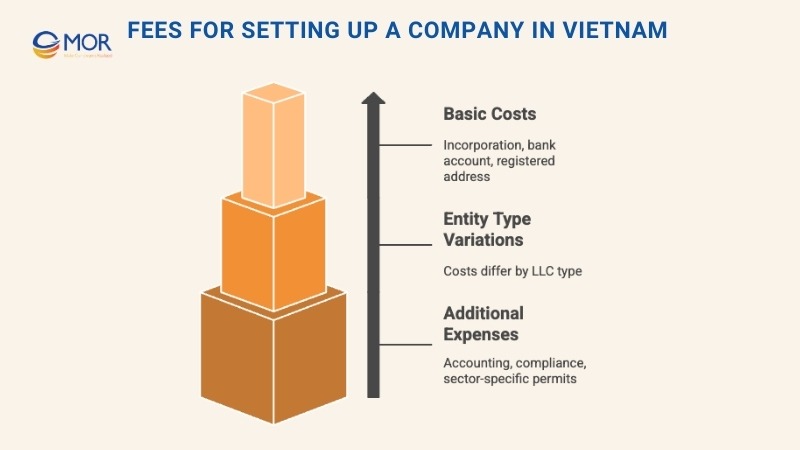
Fees For Setting Up A Company In Vietnam
Timelines
On average, setting up a wholly foreign-owned company in Vietnam requires about 17 weeks. The duration may vary depending on the type of entity, sector, and complexity of the application.
Service Stage | LLC (Services) | LLC (Trading) | LLC (Manufacturing) | Free Zone Company | Joint Venture | Nominee Company | Joint Stock Company (JSC) | Branch | Representative Office (RO) |
| Engagement planning | 2 weeks | 2 weeks | 2 weeks | 2 weeks | 2 weeks | 2 weeks | 2 weeks | 2 weeks | 2 weeks |
| Company incorporation | 8 weeks | 20 weeks | 30 weeks | 12 weeks | 12 weeks | 2 weeks | 8 weeks | 12 weeks | 8 weeks |
| Bank account approval | 4 weeks | 4 weeks | 4 weeks | 4 weeks | 4 weeks | 4 weeks | 4 weeks | 4 weeks | 4 weeks |
| Internet banking approval | 2 weeks | 2 weeks | 2 weeks | 2 weeks | 2 weeks | 2 weeks | 2 weeks | 2 weeks | 2 weeks |
| Engagement completion | 1 week | 2 weeks | 2 weeks | 1 week | 1 week | 1 week | 1 week | 1 week | 1 week |
| Total period | 17 weeks | 30 weeks | 30 weeks | 21 weeks | 21 weeks | 11 weeks | 17 weeks | 21 weeks | 17 weeks |
These timelines highlight why careful planning is vital when you set up company in Vietnam. Each step, from incorporation to banking setup, must be completed before operations can begin.
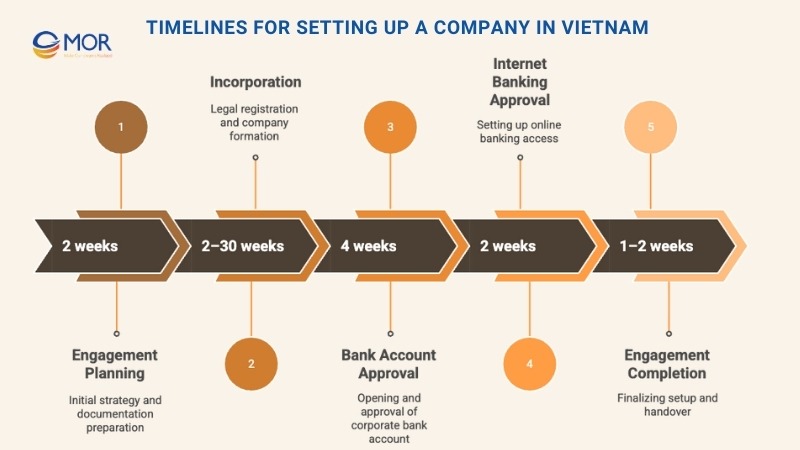
Timelines For Setting Up A Company In Vietnam
MOR Software – Your Partner for Setting Up Company in Vietnam
Setting up a company in Vietnam is only the first step. To succeed in a competitive market, new businesses need reliable technology from day one. MOR Software supports foreign and local investors after the legal formation process, ensuring their operations start strong and scale smoothly.
Our role includes:
- Digital readiness consulting so your business has the right tools and systems in place before launching.
- Dedicated development teams to build and customize software that fits your specific industry needs.
- Custom web and mobile solutions to manage sales, marketing, operations, and customer engagement.
- Ongoing technical support to maintain stability and help your systems grow with your business.
With MOR Software, your newly established company is equipped not just to operate, but to compete and expand with confidence.
FAQs: Set Up Company in Vietnam
Can foreigners set up companies in Vietnam?
Yes. Foreigners are allowed to fully own a local company. However, for certain industries listed in Vietnam’s WTO commitments, you may need to form a joint venture with a local partner. The required local ownership share depends on the specific business sector.
How much does it cost to set up a company in Vietnam?
The cost varies based on the type of business, legal services, and licensing fees. Generally, you can expect to pay for business registration, legal consultation, and other setup expenses, which may range from a few hundred to a few thousand US dollars.
How long does it take to set up a company in Vietnam?
The process can take between two to six weeks, depending on the complexity of your business structure, required approvals, and how quickly documents are prepared and submitted.
How long would $100 last in Vietnam?
Budget travelers could stretch $100 over four days, covering meals and budget lodging at around $25 daily. Mid-range travelers might spend $35–$65 per day, allowing for nicer hotels, restaurants, and taxi rides.
Is $40 USD a lot in Vietnam?
Yes, it’s enough for a backpacker’s daily expenses, including meals, transportation, and accommodation. For a more comfortable travel style, $60–$100 a day would cover upgraded hotels, domestic flights, and fine dining.
What can you buy with 100,000 dong in Vietnam?
You can enjoy a variety of street foods like bánh tráng trộn, bubble tea, fried fermented pork rolls, or sweet soups. Most items cost between 5,000 and 25,000 VND, so 100,000 VND could get you a generous street food spread.
Can foreigners own 100% of a business in Vietnam?
Yes. Through structures such as a 100% Foreign-Owned Enterprise, investors can establish a business fully under their control. This setup gives complete decision-making power over operations.
How to open an LLC in Vietnam?
An LLC must have between two and 50 shareholders, all with legal status under Vietnamese law. Registration involves submitting the required documents to the Department of Planning and Investment and following Vietnam’s business setup regulations.
Is private ownership allowed in Vietnam?
Private land ownership is not permitted. All land belongs to the people, with the State managing its use. However, individuals and companies can hold long-term land-use rights for housing, business, or investment purposes.
Is $1,000 USD a good salary in Vietnam?
Yes, it is above the national average. While unskilled workers earn around $170–$430 monthly, skilled professionals may earn $430–$1,000 or more, depending on industry and experience.
How much is 1 month’s rent in Vietnam?
Monthly rent for a one-bedroom apartment in the city center ranges from $300–$800 depending on the city. In suburban areas, prices are lower, from about $200–$500.
What is very cheap in Vietnam?
Vietnamese coffee, especially robusta varieties, and silk products like scarves and robes are much cheaper than in many countries, especially when purchased from local markets.
Is 50,000 dong a good tip in Vietnam?
Yes, it is considered a fair tip for drivers, spa staff, or mid-range restaurant service. For higher-end restaurants, a 5–10% tip is common if a service charge is not already included.
What is the average salary in Vietnam?
As of 2025, the average monthly income is about 14.9 million VND (around $600 USD), with salaries differing widely by sector, location, and experience level.
Conclusion
To set up company in Vietnam, investors must handle licensing, registration, and compliance steps that often feel complex. Understanding how to setting up a company in Vietnam is key to avoiding delays and extra costs. Vietnam’s fast-growing economy, trade agreements, and skilled workforce make it a strong choice for foreign investors.
MOR Software helps businesses succeed beyond incorporation. From digital consulting to custom software and long-term support, we prepare your company to compete and grow in Vietnam’s market. Contact us today to start your business journey in Vietnam with confidence.
Rate this article
0
over 5.0 based on 0 reviews
Your rating on this news:
Name
*Email
*Write your comment
*Send your comment
1